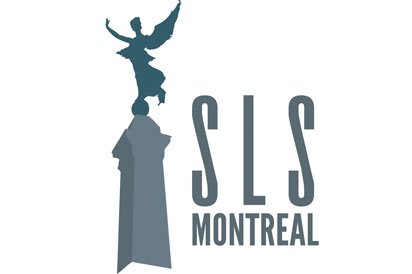
The SLS Interviews: Lee Henderson
The Man Game author on the Vancouver riots, potent magical objects and doodling.
Lee Henderson is the author of The Broken Record Technique (Penguin Canada) and The Man Game. The Broken Record Technique won the 2003 Danuta Gleed Literary Award, and The Man Game was shortlisted for the 2008 Rogers Writers' Trust Fiction Prize and won the 2009 Ethel Wilson Fiction Prize as well as the 2009 City of Vancouver Book Award. He is a contributing editor to the arts magazines Border Crossings in Canada and Contemporary in the UK . Henderson co-organizes Father Zosima Presents, a monthly night of sound performances in Vancouver , B.C.
I met Lee Henderson in the spring of 2010, at the Banff Writing Studio. It killed me how he would doodle all over my manuscript, sometimes in lieu of commentary. If he thought something was funny, he'd draw a guy laughing. Later, when I finished The Man Game , I thought Wow, I didn't see that coming. But who did?
I interviewed Henderson via email.
Anna Leventhal: What do you think is next for Vancouver? Is the city just going to disband and relocate its population to Red Deer?
Lee Henderson: I pity the Red Deer of that scenario! Ha ha. Oh my god, Anna, it's so true, though. One of the most insipid demonstrations of civil disobedience ever witnessed. The last time something this insipid happened on a mob level in the city was the Guns N' Roses riot. See YouTube video: http://youtu.be/g_pP40K55Eo
I've been stuck here in gorgeous Montreal, as you know, because we watched game seven together at Romolo with all the great expat Vancouver fans. And so when I'm not spending time teaching and drinking with the SLS folks, I'm kind of glued to my Facebook updates as I hear from all my friends in Vancouver. Everyone has a story to tell, and the sense of collective shame, I feel it. We didn't want a riot. We didn't need one. A riot is a very misunderstood mentality, though, and we are afraid to recognize its power until it happens. And it can happen anywhere. What incites a riot is never political, I don't think, but the fear of the mob to disobey the most violent individuals in their huddle.
And also I guess it's obvious that riots are extraordinarily gender biased, and that the media talks its way around that huge issue.
AL: You wrote extensively about masculinity, violence and Vancouver in The Man Game. You must be feeling a little creepy art/life overlap right now.
LH: At first I just felt so bummed out. Even though I learned in writing the novel that a riot was somehow inevitable if you don't give young men a streetwise distraction, I still found it totally disappointing to watch it all happen again. I moved to Vancouver the month of the May '94 riot when the Canucks lost in game seven, and it was an amazing experience I won't forget, outrunning the mob and the police and trapped locked in the Denny's until 4 a.m. while tear gas floated by and people puked against the windows. I know how I felt as I OD'd on pancakes and coffee after witnessing a man fall to his death and the riot that followed. The novel I wrote was a great deal of personal response to that night, in a story about the race riot of 1887 and the original wastoids of the wild west.
AL: That's intense! Okay, so in The Man Game all that shiftless testosterone gets transmuted into "the man game," which is a thing of beauty, in its own way. Is it a kind of redemption? Or is it just the purest, most stripped-down (no pun intended) expression of what's at the core of humanity? (Sorry to go all Joseph Conrad on you...)
LH: I tried to make the game something of an open metaphor that was there to interpret. For each character in the book it means something a little different, and for each reader, I hope. I don't know if the man game redeems the players or if it just helps them avoid worse shit, distracts them from the will and desire to riot, kill, or go to war.
The complicated thing about sports is that they do act as metaphor for real combat, but doesn't help replace it, the wars go on and on. Fans get notoriously outrageous, whether it's UK football hooliganism or what we just saw in Vancouver. So I imagined a character in Molly Erwagen who sees that we need to invent a post-game tradition for fans that vents all of our sporting, theatrical booze-engorged energy. It has to be as hardcore as a riot, it has to be a riot, and so much better. And so Molly realizes the sport has to take place in the street, impromptu, so that the street is no longer the staging place for a riot. The man game makes the street a stage and the audience the players.
AL: Tell me about The Note.
LH: The Note is something I make a point of teaching, and you and I talked about it when we hung out in Banff. The Note is one of the most potent magical objects in a narrative story. Strangely enough, it is an actual note. On a piece of paper, or some very tangible thing with text written on it. Not just any text. To make it The Note, it has to be a very special kind of language. The Note's popular and very useful in a writer's fannypack of story techniques. So far as story revisions go, it's the best bit of artifice I can think of, partly because it is meant to subtly assure the reader that the writer knows exactly what's going on. Check out The Note in Jeffrey Eugenides story in the New Yorker, not the most recent one, but the one titled "Extreme Solitude."
The other thing to know about Notes is that unless you're writing spy stories, they are best when they appear in only one of two specific places in a story.
AL: After you pointed it out I started noticing it everywhere, like how when one person's pregnant suddenly everyone is. I like that you call it a magical object, because it suggests that writers are dealing in something material, as opposed to floating around in an ineffable world of ideas. How does your writing process tie in to your relationship with the world of things?
LH: There are certain things I see in my mind that I've never written about, that I have no clear relationship to, but that I think about all the time. A yellow gate. I've been thinking about a yellow gate for many years. I often see steel wool, up close, in my mind's eye, ever since I was a kid. It's an awful kind of image, the steel wool. It's a contagion, or flu of wool, a steelwire virus of some kind. The yellow gate, it's in a secluded alley, but people keep going through it. I once saw a baker all in white carry a cakebox through the yellow gate and go knock on the back door of a clapboard house.
AL: Have you been drawing lately?
LH: I did a bunch of collages of silver screen movie stars / birds in the last few years. I had a big drawing in a show in Halifax recently, curated by Joe Haley. I think this next novel will have a lot of drawings in it. I'm not a very good drawer, very limited capacity for elbows and knees and fingers. I find it hard to draw street scenes. I run out of steam faster than I do with writing—I can't draw seriously eight hours straight day after day. But I'm obsessed with drawing, I doodle constantly.
AL: What impressions will you take back with you from this trip?
LH: The Montreal writing scene is amazing!
Anna Leventhal is a Montreal writer whose work has appeared in Geist, Matrix and The Journey Prize Stories 20. She is the contributing editor of The Art of Trespassing, a short-story anthology from Invisible Publishing, and she co-hosts "Venus," a music show on CKUT 90.3 FM. Her story "Last Man Standing" appears in the Summer 2011 issue of Maisonneuve.
Montreal's Summer Literary Seminars take place from June 12 to June 25, 2011. For a schedule of events, or to buy a pass, visit www.sumlitsem.org/montreal/schedule.html
Subscribe to Maisonneuve today.
Related on maisonneuve.org:
—The SLS Interviews: Gary Shteyngart
—The SLS Interviews: Adam Levin
—The SLS Interviews: Lynne Tillman
Follow Maisonneuve on Twitter — Like Maisonneuve on Facebook






